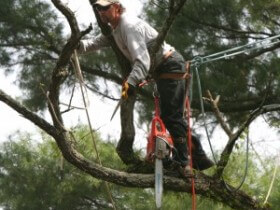Gardening isn’t just a means to adorn your landscaping. It isn’t only a pastime for hobbyists with a green thumb. A garden provides its owner with serenity, contentment, and a deeper understanding of the things in life that truly matter. The effects can be especially profound if gardening is something you excel at.
Learn the proper way to lay sod. Your soil should be prepared before you lay the sod. Weed the soil well, and till the entire lawn area. Compact the soil firmly but lightly, and make certain it is flat. Water the soil until it is saturated. Sod should be staggered in rows, the joints offsetting from each other. Cut away extra sod and save it to fill in gaps you may create later. Your sod should be watered everyday for at least two weeks, then it will root itself and walk on it.
Consider planting slug-proof perennials. Slugs or snails can kill a plant very quickly. They tend to enjoy perennials that have thin, smooth, tender leaves, especially those of young plants. Perennials with hairy leaves or bitter taste are unattractive to snails and slugs, keeping them safe from harm. Some perennial families that snails and slugs won’t eat include achillea, campanula, and helleborus.
Use both biennials and annuals to add color to your flower bed. These types of flowers grow at high speed, which gives you more flexibility in changing the look of your flower beds as the seasons change. In addition, you might need something to fill empty spaces in your flower garden. Fill gaps with annuals or biennials. Just make sure the flowers will get enough sun to thrive. A variety of flowers that will thrive in your region are available.
Bulbs are the best solution to get flowers in spring and in summer. Bulbs are one of the easiest plants to grow and are hardy perennials that return each year. Different types of bulbs bloom at different times, so if you choose appropriately, you can have blooms from early spring to late summer.
Fertilizer is important when you garden. Manure helps your plants grow. Make sure you use a product that is commercially composted so you don’t risk adding pathogens to your garden. Many types of fertilizers are available. The type you utilize is not critical; just be sure to use one.
Using pest-resistant plants or natural materials in your garden is a good way to keep pests away. Plant marigolds or onions around other vegetables to keep slugs away from them. Wood ash, when used as mulch, can help keep insects away from trees and shrubs. Using these natural methods will reduce the need for potentially harmful chemical pesticides.
Pest control can become a major issue. It’s wise to avoid harsh insecticides if you plan on consuming your fresh fruits and vegetables. So to help you control the pests that may invade your garden, you will want to stay vigilant. By noticing them at an early stage, you can simply pluck them away from your plants with your fingers.
You can attract the insects you need by planting heather. Bees are drawn to heather, as heather is an early provider of spring nectar. Because heather beds require very little maintenance, they often become the home of spiders, ground beetles, and other insects that can benefit your garden. Always remember this, and wear your horticulture gloves if you prune your heather!
Apply these tips to make your garden a beautiful oasis. Your plants and shrubs will thank you from the bottoms of their roots. Gardening is something that can change your life, if only you will let it, so get to it.
Many people aren’t sure where they can learn about mdyhome.com. Luckily, you will be able to find all the information you need right here. Just put all this advice to good use.




